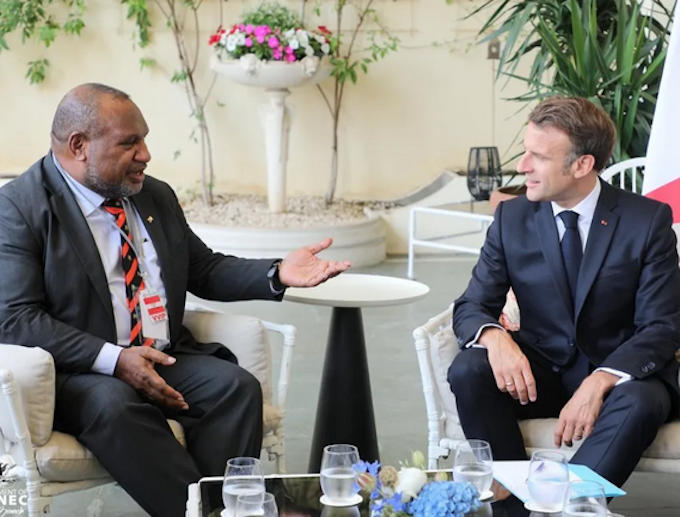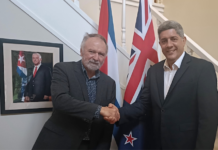
ANALYSIS: By Scott Waide, RNZ Pacific PNG correspondent
The recent series of high-level agreements between Papua New Guinea and France marks a significant development in PNG’s geopolitical relationships, driven by what appears to be a convergence of national interests.
The “deepening relationship” is less about a single personality and more about a calculated alignment of economic, security, and diplomatic priorities with PNG, taking full advantage of its position as the biggest, most strategically placed island player in the Pacific.
An examination of the key outcomes reveals a partnership of mutual benefit, reflecting both PNG’s strategic diversification and France’s own long-term ambitions as a Pacific power.
A primary driver is the shared economic rationale. From Port Moresby’s perspective, the partnership offers a clear path to economic diversification and resilience.
But many in PNG have been watching with keen interest and asking: how badly does PNG want this?
While Prime Minister James Marape offered France a Special Economic Zone in Port Moresby (SEZ) for French businesses, he also named the lookout at Port Moresby’s Variarata National Park after President Emmanuel Macron drawing the ire of many in the country.
The proposal to establish a SEZ specifically for French industries is a notable attempt to attract capital from beyond PNG’s traditional partners.
Strategically coupled
This is strategically coupled with securing the future of the multi-billion-dollar Papua LNG project.
Macron’s personal undertaking to work with TotalEnergies to keep the project on schedule provides crucial stability for one of PNG’s most significant economic ventures.
For France, these arrangements secure a major energy investment for its national corporate champion and establish a stronger economic foothold in a strategically vital region between Asia and the Pacific.
In the area of security, the relationship addresses tangible needs for both nations.
PNG is faced with the immense challenge of monitoring a 2.4 million sq km Exclusive Economic Zone, making it vulnerable to illegal, unreported, and unregulated (IUU) fishing.
The finalisation of a Shiprider Agreement with France provides a practical force-multiplier, leveraging French naval assets to enhance PNG’s maritime surveillance capabilities. This move, along with planned defence talks on air and maritime cooperation, allows PNG to diversify its security architecture.
For France, a resident power with Pacific territories like New Caledonia and French Polynesia, participating in regional security operations reinforces its role and commitment to stability in the Indo-Pacific.
Elevating diplomatic influence
The partnership is also a vehicle for elevating diplomatic influence.
Port Moresby has noted the significance of engaging with a partner that holds permanent membership on the UN Security Council and seats at the G7 and G20.
This alignment provides PNG with a powerful channel to global decision-making forums. The reciprocal move to establish a PNG embassy in Paris further cements the relationship on a mature footing.
The diplomatic synergy is perhaps best illustrated by France’s full endorsement of PNG’s bid to host a future UN Ocean Conference. This support provides PNG with a major opportunity to lead on the world stage, while allowing France to demonstrate its credentials as a key partner to the Pacific Islands.
This deepening PNG-France partnership does not exist in a vacuum.
It is unfolding within a broader context of heightened geopolitical competition across the Pacific.
The West’s view of China’s rapid emergence as a dominant economic and military force in the region has reshaped the strategic landscape, prompting traditional powers to re-engage with renewed urgency.
increased diplomatic footprint
The United States has responded by significantly increasing its diplomatic and security footprint, a move marked by Secretary of State Antony Blinken’s visit to Port Moresby to sign the Defence Cooperation Agreement.
Similarly, Australia, PNG’s traditional security partner, is working to reinforce its long-standing influence through initiatives like the multi-million-dollar deal to establish a PNG team in its National Rugby League (NRL), a soft-power exercise reportedly linked to security outcomes.
This competitive environment has, in turn, created greater agency for Pacific nations, allowing them to diversify their partnerships beyond old allies and providing a fertile ground for European powers like France to assert their own strategic interests.
A strong foundation for the relationship is a shared public stance on environmental stewardship. The agreement on the need for rigorous scientific studies before any deep-sea mining occurs aligns PNG’s national policy with a position of environmental caution.
This common ground extends to broader climate action, where France’s commitment to conservation in the Pacific resonates with PNG’s status as a frontline nation vulnerable to climate change.
This alignment on values provides a durable and politically important basis for cooperation, allowing both nations to jointly advocate for climate justice and ocean protection.
For the Papua New Guinea economy, this deepening partnership with France is critically important as it provides high-level stability for the multi-billion-dollar Papua LNG project and creates a direct pathway for new investment through a proposed SEZ for French businesses.
Vital economic resource
Furthermore, by moving to finalise a Shiprider Agreement to combat illegal fishing, the government is actively protecting a vital economic resource.
For Marape’s credibility in local politics, these outcomes are tangible successes he can present to the nation as he battles a massive credibility dip in recent years.
Securing a personal undertaking from the leader of a G7 nation, gaining support for PNG to host a future UN Ocean Conference, and enhancing national security demonstrates effective leadership on the world stage.
This allows him to build a narrative of a competent statesman who, through “warm, personal relationships”, can deliver on promises of economic opportunity and national security while strengthening his political standing at home.
This article is republished under a community partnership agreement with RNZ.












































